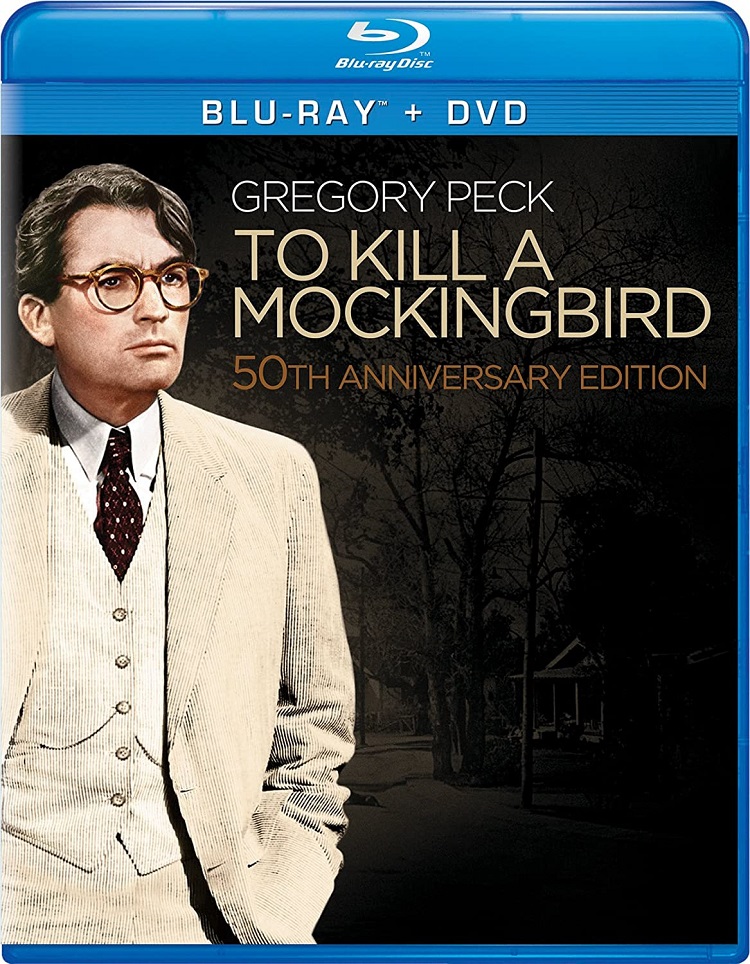
Based on Harper Lee’s Pulitzer Prize-winning novel of the same name, To Kill a Mockingbird is a highly acclaimed film that puts the spotlight on a small Southern town where a few men stand up for what is right and just.
Jean Louise “Scout” Finch is the narrator who looks back to when she was a six-year-old child (Mary Badham) during the summer of 1932 when her widowed father, lawyer Atticus Finch (Gregory Peck in an Oscar-winning performance) was assigned and defended Tom Robertson, (Brock Peter) an African American man charged with raping Mayella Ewell (Collin Wilcox). Scout, her brother Jem (Phillip Alford), and their new friend Dill (John Megna) lost their childhood innocence as the reality of how cruel and dangerous the world could be was revealed to them.
Things start out playful as Scout and Jem show Dill around. They see the cranky Mrs. Dubose (Ruth White), an elderly woman who shouts at people passing by from her porch. The kids tease and laugh at her, but Atticus speaks to her with respect. There’s a mysterious boy named Boo, who no one ever sees and according to legend “eats raw squirrels and all the cats he can catch.” As the boys try to get a peek at Boo, his father Nathan Radley (Richard Hale) shoots a rifle in their direction, claiming he heard a prowler. However, it’s more likely it was a warning for nosy neighbors since that probably wasn’t the first time someone was bothering the Radleys.
Atticus and his children have an unusual relationship, possibly due in part to his being their only living parent. They call him by his first name and desire to spend time in his presence, which he welcomes even though he tries to get them to leave him be so he can deal with grown-up matters. They sneak into the courthouse balcony, the only place African Americans are allowed to watch the proceedings. Atticus’ intelligence and character are revealed as he disproves the evidence and offers a more likely theory about what happened to Mayella, but his defiance against the community has ramifications, though how dire they are depends on who else is willing to come to the defense of Atticus and his family.
In celebration of Universal Studio’s 100th Anniversary, they are releasing “a selection of [their] most unforgettable films” which conveniently ties in with the film’s 50th anniversary. Released on Blu-ray for the first time, the video has been given a 1080p/VC-1 encoded transfer displayed at 1.85:1. Russell Harlan’s black and white cinematography looks very good across the spectrum with this transfer. Blacks are rich, there is a variance of gray, and whites are sharp, but never blown out. Objects are well defined and the image delivers quality shadow delineation. Grain has been reduced by DNR, but not too a detrimental effect. The audio is available as a DTS-HD Master Audio 5.1 track but it’s mainly Elmer Bernstein’s fine score and ambient effects that make use of the surrounds. The latter is very impressive as crickets chirp from the rears like they are right outside the window. The dialogue is clear and distinct throughout and all the elements are well balanced in the mix.
The following bonus features accompany the film and are all SD unless specified. Director Robert Mulligan and producer Alan Pakula sit together for an informative commentary track about the production. A number of honors Peck received are available to revisit or see for the first time. There is his acceptance speech (1 min) for winning the 1963 Academy Award for Best Actor, which was presented by Sophia Loren; the AFI Life Achievement Award (10 min) from 1989; and an Excerpt from Tribute To Gregory Peck (10min) by his daughter Cecilia who extols the virtues of Gregory as a father, likely some time after his death in 2003. Scout Remembers (12 min) finds actress Mary Badham interviewed by NBC News in 1999. There is also 100 Years of Universal: Restoring the Classics featurette on the film’s restoration process (HD, 9 min), a feature likely to be seen on all the titles in the Universal 100th Anniversary collection; the original theatrical trailer; and a digital copy.
Universal has also created features exclusive for Blu-ray that should direct fans want to seek that format. Narrated by Cecilia and Anthony Peck, the U-Control Scene Companion is a visual commentary track that appears to have much, if not all, taken from the following feature. Fearful Symmetry (SD, 90 min) is a fascinating look at both the creation of the film and the influences on the book with members of the cast and crew as well as the people who lived with Lee in the Monroeville, Alabama. Quite interesting to see how much was based on true people and events. Directed by noted documentarian Barbara Kopple, A Conversation with Gregory Peck (SD, 98 min) takes place during a Q&A tour in the late ’90s where he shared memories about his career. The tour is intercut with current events of his life from receiving the National Medal of the Arts to attending the birth of a grandchild. It was great to see the man and discover he doesn’t seem much different from the actor.
To Kill a Mockingbird is one of those rare films that is equal to the book it is derived from. At the core of the film’s greatness is Lee’s writing, adapted by screenwriter Horton Foote. This story is well written, offering a plot with unexpected turns and characters that make believable, and more importantly inspirational, choices. Atticus embodies an ideal people respect and strive for as he willingly chooses to do the right thing, no matter that it will likely turn the community against him. Universal celebrates the film’s golden anniversary with a quality high-definition transfer and features that will expand the viewer’s appreciation of the work and those involved in its creation.